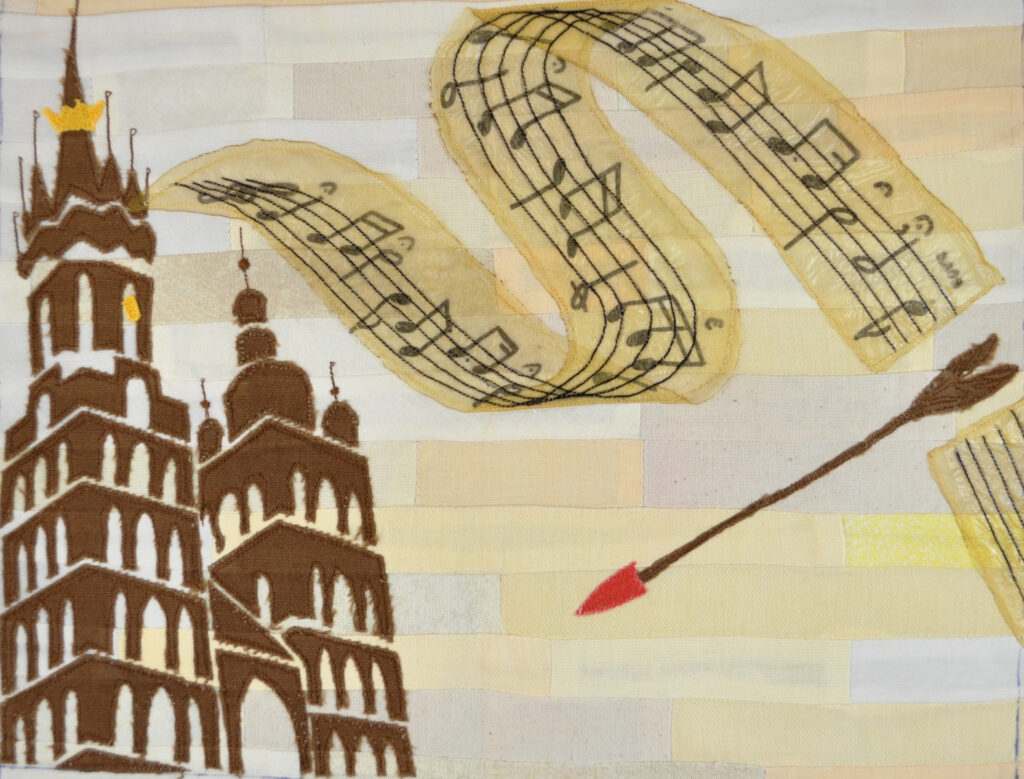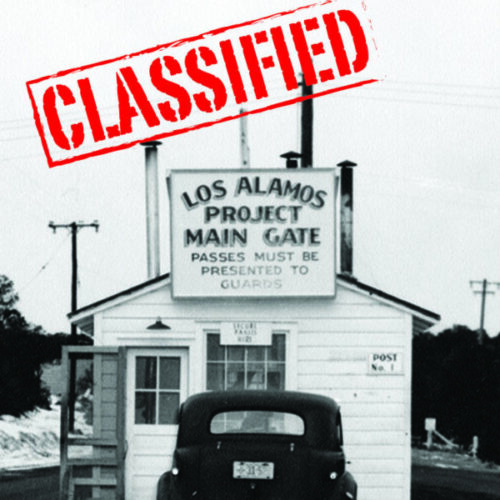A short story extract from book three of the R.M. Dolin trilogy, “What Is to Be Done”

Summary: Padre uses his jazz trumpet to demonstrate how he’s able to convince Bishop Abbadelli to allow him to play in a salsa band. In the process, the story of the Polish Hejnal Mariacki is told, as well as why it’s so profound to men like Jake and the old man who moved into the Valdez house six months ago and comes to Armando’s bar every night for a beer and bump.
Just as Armando reaches the back table, Padre returns carrying a well-worn trumpet case. On his way past the old man, Padre makes eye contact and smiles but doesn’t say anything. After clearing a spot on the poker table, Padre puts the trumpet case down and opens it to reveal a lush ruby red velvet lining encasing a highly polished brass trumpet with silver inlay and pearl topped valves. The faux alligator skin case with lush red velvet set atop the poker table’s emerald green felt framing the trumpet, as well as what happens next, in a magical context. From the smell alone you can tell the trumpet’s old, and from the reverent way Padre handles the instrument as he removes it, tells you it’s special. Padre holds the trumpet in his left hand while inserting the silver mouthpiece with engineering precision.
“So you auditioned for the Bishop?” Jake assumes unimpressed.
“I did more than that Cabron,” Padre proudly smiles. “Bishop Abbadelli has very strong views about Priests doing much of anything outside their parish duties. We started our meeting with a long discussion about the role of a Parish Priest in rural New Mexico and it was pretty clear in his view my responsibilities didn’t extend to playing in a Salsa band.”
“You blackmailed him didn’t you?” Armando asserts eager to be the first to guess the right answer.
“No!” Padre indignantly fires back.
“So, you offer him a cut of the action?” Armando files his second option with renewed enthusiasm. “That can buy a guy a lot of absolution.”
“You going to let me tell this story?” Padre grouses as much offended as he is impatient with his friend’s distracted implication. Armando nods submissively. “As I was saying,” Padre restarts after waiting long enough to make sure his point is made. “It doesn’t look like Bishop Abbadelli has any intention of yielding, no matter how many different logical arguments or passionate pleas I make. So as a last resort, I offer a wager. You see,” Padre adds with a devilish grin, “I learned from my research that our beloved Bishop has a thing for the ponies, so figuring a gambling man can’t resist so, I propose playing a song.”
“What kind of wager is that?” Jake scorns, earning him the same annoyed stare moments ago was reserved for Armando. Jake glances at Armando who grins back glad to not be the only one earning a famed Padre scowl.
“I bet him I could play a song that would make him cry,” Padre methodically states. “If I do, he has to let me play in my Salsa band. If he doesn’t cry, I agree to set aside my musical aspirations.”
“That’s a hell of a one-sided bet,” Jake interjects with condemnation toward Padre for being so rash and uncalculating. “Pot odds alone say he has to accept.”
“Exactly,” Padre fires back. “If the pot odds, as you call them, were not hugely in his favor he would never agree.” Even with so much temptation, Bishop Abbadelli thinks long and hard before finally deciding it’s the only way to put this matter to rest.”
“A little Latin serenade to torch the soul, eh Cabron?” Armando seductively speculates barely containing his excitement.
“No one cries listening to Latin.” Padre forcefully answers while showering Armando with another scowl. “Even our sad songs are joyful.”
“What then?”
“A simple five note song I learned in seminary,” Padre triumphantly sings while raising the trumpet to his lips. With slow and deliberate flare, he begins his deep mournful ode.
The Hejnal Mariacki, pronounced ‘hey-now Mahr-yahts-kee’ is both the Polish and Krakow anthems whose origins go all the way back to the 1200’s when Krakow was a walled city. Trumpeters would play the five-note song in the morning to announce the gates being opened and again in the evening to summon workers back before the gates close. The Hejnal, is named after the Hungarian born Jadwiga, who from 1384 until 1399 was Queen of Poland. The literal translation for the Hejnal Mariacki, is “Saint Mary’s Dawn.” In the 1200’s, each time the Hejnal was played, a lone trumpeter would climb the tall tower of Saint Mary’s Church in the center of old Krakow from which he could see every corner of the stone wall protecting the city, as well as far into what was once the surrounding countryside. The Poles who worked outside the city walls were trained to drop whatever they’re doing when the Hejnal plays, because failure to get inside before the gates closed means you spent the night outside dealing with the uncompromising elements, wild animals, and marauding barbarians.
The legend of the Henjal began in 1241 during one of several Mongol invasions. As the story goes, the Mongols attempt to put a sneak on Krakow late one afternoon. Their plan is to work up close while the gates are open, and then storm the entrances overwhelming the surprised guards before they can be closed. Once inside, the many terrible and horrific things the Mongols are notorious for can proceed with little encumbrance. If past behavior is any indication, Krakow would cease to exist. The Mongol General Subutai, thought he’d devised the perfect strategy; however, things went awry when a sentry in the tower of Saint Mary’s spotted the Mongols moving about in the perimeter forest and began to play the Henjal to warn the workers to get inside quickly and the guards to close the gates in advance of the Mongol assault. But General Subutai wasn’t stupid, and as a precursor to his attack, he disguised and pre-positioned his best archers within the city walls. As the Polish sentry began his fourth repetition of the five-note Hejnal, a Mongol archer at the base of Saint Mary’s tower, shot the Polish sentry in the throat, killing him instantly and causing an abrupt halt to the Hejnal.
The Polish sentry’s sacrifice saved Krakow because the city gates close before the Mongol army can storm inside. To this day, the Hejnal is played at noon every day on Polish National Radio, where the song abruptly ends in the middle of the fourth repetition. It’s also played every hour from Saint Mary’s tower in old Krakow, just as it was that fate-filled day seven hundred and eighty years ago. The song’s a reminder to the proud Polish people not only of the sacrifice the Sentry made to save Krakow, but of the countless sacrifices Polish men and women have made for centuries to preserve and protect their blessed motherland.
The legend of the Hejnal Mariacki grew in World War II during the repatriation of Italy. The Italian campaign was perhaps the hardest fought and most difficult of the European theater. In the winter of 1944, the Battle of Monte Cassino begins. This pivotal engagement is also referred to as the Battle for Rome. Three times Allied forces attempted to capture Monte Cassino and each time the Germans repelled their attack. The British tried and failed, the Americans tried and failed, the combined allied armies tried and failed, and at the very high cost of over sixteen thousand casualties. On the fourth assault the Polish army, bent on wrenching Rome away from the evil Axis scourge, surged through German defensives after an intense and prolonged assault to capture the mountain. To mark the huge victory for both the Allied forces and the Polish Army, and to honor the many who sacrificed so much to achieve victory, a trumpeter from the 2nd Polish Corps stood on the rubble of what was once the Monte Cassino Abbey at the top of the mountain and played the Hejnal Mariacki. He abruptly ends his tribute in the middle of the fourth repetition.
Jake is about to spiral into the darker places of his memory as he recalls his first time hearing the Hejnal while on his honeymoon, when Padre abruptly stops playing part way through the fourth stanza. Jake is so lost in his time with Emelia, he doesn’t even realize that somewhere between Saint Mary’s Church in Krakow and the small chapel in the French countryside where he exchanged vows with his beloved Emelia, he’s starts to cry. If you asked him, he couldn’t tell you why, he just does. People assume that when a Pole cries while hearing the Hejnal it’s because of some sort of genetic reaction, but that’s not true; it’s because of the song’s ability to conjure profound memories that usually don’t get thought about without significant prodding. While Latinos may be passionate to their emotions, Poles are sensitive to their past, which is why they cry when the Polish anthem is played.
“Cabron!” Armando teases. “Tell me you’re not crying?”
“What can I say?” Jake answers unashamed while wiping tears from his face. “Sometimes that song catches me unprepared.
“I can sort of get him,” Armando says to Padre pumping his thumb at Jake. “He’s Polish afterall, but I don’t get how you got Bishop Abbadelli to cry or better yet how you knew he would?”
Padre pulls the mouthpiece from the body of his trumpet and puts both gently in their case. He looks up hoping to conceal any tears that might have escaped his water-filled eyes. “Bishop Abbadelli like to tell the story about how he was a boy in Rome when the Polish army rescued his family from the Germans. Once the battle had been won, and the Poles paused to play the Hejnal from atop the rubble of what was left of Abby Monte Cassino Hejnal Mariacki became as profound to the people of Rome who survived the battle as it is for the people of Poland. You saw how he reacted,” Padre says gesturing toward Jake. “I counted on Bishop Abbadelli having the same reaction.”
“But you wagered so much Cabron, no one can ever know for certain.”
“Well said,” Padre smiles softly at both his friends. “I went all in with the Bishop, just as Jake did for Sympatico, because it had to be. True believers my friends,” Padre expands his lesson while catching Jake’s cynical eyes, “Know when to let the invisible hand guide them. They know when to risk everything.” Padre snaps shut the case and lifts it from the poker table. He carries the case through the bar on his way back to the car, again glancing at the old man who’s now finished his beer and bump. This time, Padre doesn’t make eye contact and doesn’t try to see what the old man’s scratched in his journal.
Had Padre taken the time to look, he would have noticed tear stains on the journal page smearing a crudely drawn image of a lone Polish soldier from the 2nd Corps, standing on top of a rubble pile playing a battered trumpet. Off to the side the old man drew a wounded American GI leaning on his crutches holding his helmet over his heart watching the Polish soldier play. On the wounded GI’s shoulder, drawn in a way most could not discern, is the insignia of the US Army Rangers. On further study Padre would have discovered lost in the details of the old man’s sketch, vague similarities between the wounded GI in the drawing and the old man who limps into the Al Azar each night alone for his beer and a bump.

